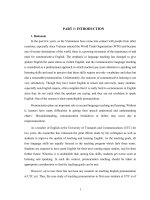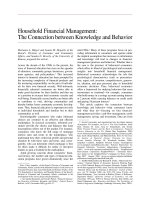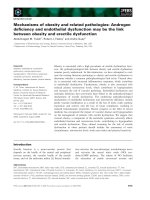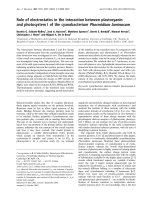94 Students making the connections between algebra and word problems
Bạn đang xem bản rút gọn của tài liệu. Xem và tải ngay bản đầy đủ của tài liệu tại đây (814.18 KB, 60 trang )
CENTRE FOR EDUCATIONAL DEVELOPMENT
Students making the connections
between algebra and word
problems
Teacher to Adviser
Team Leader, Numeracy and Mathematics
Centre for Educational Development
Massey University College of Education
Palmerston North
New Zealand
Palmerston North (New Zealand)
NZAMT-11 conference
New Zealand schools
Years 1- 6
Primary
Years 7 & 8
Intermediate
Years 9 -13
Secondary
Full
primary
Year 7–13
Issues in education in New Zealand
• Numeracy and literacy
• Curriculum
• Assessment
– NCEA
– Technology
– National testing
You didn’t tell me it was a word problem
..\little league movie_WMV V9.wmv
Difficulties with word problems
•
•
•
•
•
Educators frequently overlook the
complexity of Mathematical English
Vocabulary
Half of the sum of A and B,
multiplied by three
Connectives
Word order
Syntactic structure Half of the sum of A and
B multiplied three
Punctuation
Context is complicated
Contextualising maths creates another
layer of difficulty – the difficulty of focusing
on the maths problem when it is embedded
in the ‘noise of everyday context’
(Cooper and Dunne, 2004, p 88)
Placing mathematics in context tends to
increase the linguistic demands of a task
without extending the mathematics
(Clarke, 1993)
The national standard in NZ
• “use algebraic strategies to investigate and
solve problems… Problems will involve
modelling by forming and solving
appropriate equations, and interpretation in
context”
• “must form equations…at least one
equation”
(assessment schedule, NZQA)
Algebra word problems in NAPLAN
Skills assessed in NAPLAN 2008
•
•
•
•
Identifies the pair of values that satisfy
an algebraic expression.
Solves a multi-step algebra problem.
Solves algebraic equations with one
variable and expressions involving
multiple operations with negative values.
Determines an algebraic expression to
model a relationship.
Algebra word problems in NAPLAN
What is it about algebra word
problems?
• What are algebra word problems?
• Why do students find them difficult?
• What can teachers do to help their
students tackle them with more
success?
Solve this word problem
A rectangle has a perimeter of 15 m
Its width is 2.2 m
Calculate the length
of this rectangle
It is a word problem…
A rectangle has a perimeter of 15 m
Its width is 2.2 m
Form and solve an equation to
calculate the length
2.2 + 2.2 = 4.4
of this rectangle
15- 4.4 =10.6
10.6 / 2 =5.3
It is a word problem
… but is it an algebra word problem?
What makes an algebra word problem?
What solution strategies are we expecting?
Is this algebra?
Is this an equation?
2.2 + 2.2 = 4.4
15- 4.4 =10.6
10.6 / 2 =5.3
Algebra word problems in NAPLAN
Methods of solving word problems
• Do you have a preferred way of solving word
problems?
• What do you consider when you are deciding
how you will tackle a word problem?
• What makes you decide to use algebra to
solve a word problem?
• Can you write a word problem that all your
students use algebra to solve?
Solving algebra word problems
•
•
Experts tend to solve algebra word
problems using a fully algebraic method.
They translate into algebra and use
algebra to find the answer.
Students commonly use a variety of
informal solution strategies. They work
with known numbers to find the answer.
Informal methods
Trial and error, guess and test, or guess,
check and improve, involve testing numbers
in the problem. These methods involve
working with the forwards operations.
Logical reasoning methods involve first
analysing the problem to identify forwards
operations, then unwinding using
backwards operations.
Informal methods work well
When 3 is added to 5 times a certain
number, the sum is 48. Find the number.
Forwards : multiply by 5, add 3
Backwards: subtract 3, divide by 5
Focus
on
translation
Four problems
Focus
on
translation
Four problems (cont)
(Stacey & MacGregor, 2000)
Informal methods have limitations
Informal methods can be effective for
simple word problems.
More complex problems such as those
with ‘tricky’ numbers as solutions and
those involving equations with the
unknown on both sides are not readily
solved by informal methods.









